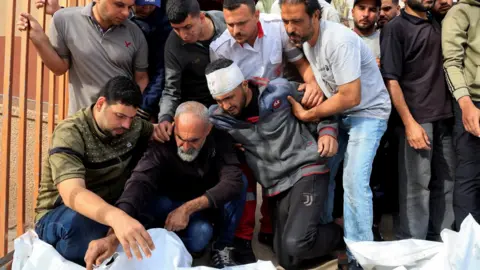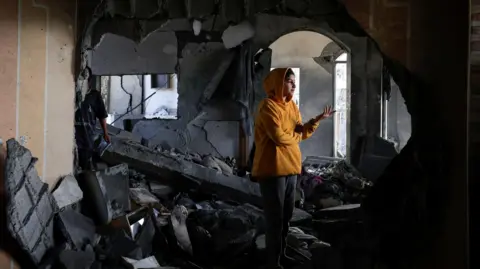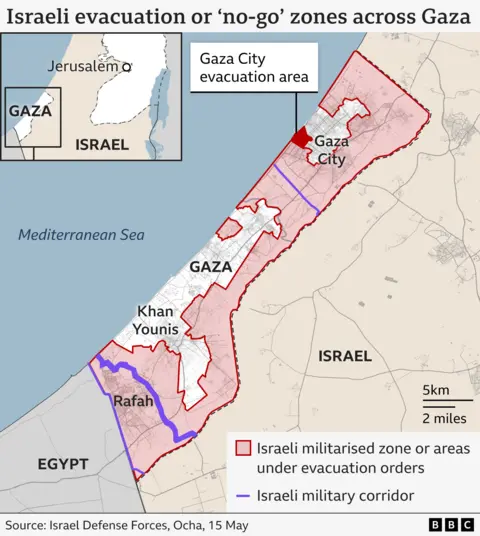Gaza correspondent
 Reuters
ReutersAt least 114 Palestinians have been killed in Israeli air strikes across the Gaza Strip since dawn, health officials and rescuers say.
Fifty-six people, including women and children, were killed when homes and tents sheltering displaced families were bombed overnight in the southern city of Khan Younis, the local Nasser hospital said.
The Israeli military said it struck Hamas and Palestinian Islamic Jihad fighters in southern Gaza.
The Hamas-run Civil Defence agency also reported deadly strikes in the northern town of Jabalia, including an attack on a health clinic and prayer hall in Jabalia refugee camp that it said killed 13 people.
Israeli forces have been intensifying their bombardment of what they say are Hamas fighters and infrastructure ahead of a planned expansion of their ground offensive in Gaza.
It comes as US President Donald Trump visits the region and indirect negotiations on a new ceasefire and hostage release deal between Hamas and Israel continue.
The streets of Khan Younis were filled with funeral processions and grieving families on Thursday morning, following what residents said were the deadliest set of air strikes in the city since Israel resumed its offensive almost two months ago.
One man told BBC Arabic’s Middle East Daily programme that Nasser hospital’s mortuary was «filled beyond capacity», and that several bodies had to be placed in the corridor before they could be buried.
Doctors were forced to treat wounded people, including those with burns, amputations and internal bleeding, on stretchers, benches and on the floor due to a lack of beds, he said.
«Among those killed today were 36 children… Entire families have been wiped from the civil registry,» he added. «Tragically, this level of destruction has become part of daily life.»
One video shared by a local activist showed medics laying dozens of bodies on the ground at a local cemetery. An imam stood nearby leading prayers for hundreds of mourners gathered behind him in orderly rows.
Safaa al-Bayouk, a 42-year-old mother of six, said her sons Muath, who was six weeks old, and Moataz, who was one year and four months, were killed in one of the strikes.
«I gave them dinner and they went to sleep. It was a normal day… [then] the world turned upside down,» she told Reuters news agency.
Reem al-Zanaty, 13, said her uncle’s family, including her 12-year-old cousin Menna, were killed when their two homes were bombed.
«We didn’t feel or hear anything until we woke up with rubble on us,» she said. «The Civil Defence did not come. I will tell you honestly we pulled ourselves [out]. My father helped us.»
Medics said local journalist Hassan Samour, who worked for Hamas-run al-Aqsa Radio, was killed along with 11 members of his family when their home in the eastern Bani Suheila neighbourhood was struck.
 Reuters
ReutersThe Civil Defence agency said on Thursday morning that its first responders had recovered the bodies of four people following Israeli strikes in the northern town of Beit Lahia and two others in the central town of Deir al-Balah.
Later, spokesman Mahmoud Basal reported that an Israeli strike on a home in Jabalia town had killed all five members of the Shihab family.
Another 13 people were killed when the al-Tawbah health clinic and prayer hall in the al-Fakhouri area of Jabalia refugee camp was bombed, he said.
Palestinian news agency Wafa reported that 15 people were killed, including 11 children.
A graphic video posted online purportedly from the scene showed two bodies covered in debris on a street next to a badly damaged building.
Amir Selha, a 43-year-old resident of northern Gaza, told AFP news agency: «Tank shells are striking around the clock, and the area is packed with people and tents.»
He also said Israeli military drones had dropped leaflets over his neighbourhood warning residents to move south.
On Wednesday, Israeli strikes killed at least 80 people across the territory, including 59 in Jabalia town and refugee camp, according to hospitals and the Civil Defence.
The Israeli military said it struck Hamas and Palestinian Islamic Jihad fighters in the north of the territory on Tuesday night. It had warned residents of Jabalia and neighbouring areas to evacuate on Tuesday after rockets were launched into Israel.

Israeli evacuation orders issued on Wednesday afternoon also caused panic among residents of a crowded area of Gaza City, in the north.
The Israeli military said a hospital, a university and several schools sheltering displaced people in the Rimal neighbourhood had become «terrorist strongholds» and that it would soon attack them with «intense force».
Separately, a US-backed organisation said it would start work in Gaza within two weeks as part of a new heavily criticised US-Israeli aid distribution plan.
The Gaza Humanitarian Foundation said it had asked Israel to let the UN and others resume deliveries until it was set up.
UN agencies have insisted they will not co-operate with the plan – which is in line with one previously approved by Israel’s government – saying it contradicted fundamental humanitarian principles.
Israel has not allowed any aid or other supplies into Gaza for 10 weeks, and aid agencies have warned of mass starvation among the 2.1 million population.
Israel imposed the blockade on 2 March and resumed its offensive against Hamas two weeks later, ending a two-month ceasefire. It said it wanted to put pressure on Hamas to release its remaining 58 hostages, up to 23 of whom are believed to be alive.
Israel launched a military campaign to destroy Hamas in response to the group’s cross-border attack on 7 October 2023, in which about 1,200 people were killed and 251 others were taken hostage.
At least 53,010 people have been killed in Gaza since then, including 2,876 since the Israeli offensive resumed, according to the territory’s Hamas-run health ministry.





